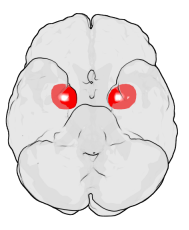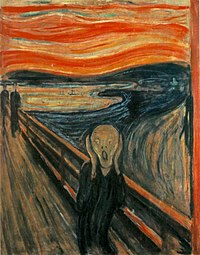
Developmental Pathways from Early Behavioral Inhibition to Later Anxiety: An Integrative Review of Developmental Psychopathology Research and Translational Implications
Sign Up to like & getrecommendations! Published in 2019 at "Adolescent Research Review"
DOI: 10.1007/s40894-018-0092-5
Abstract: Anxiety is among the most prevalent, early emerging, and detrimental mental conditions for children and adolescents. As with most psychiatric disorders, prevention and intervention efforts are most effective when the early etiology of the disorder… read more here.
Keywords: research; anxiety; review; behavioral inhibition ... See more keywords

Nonhuman Primate Models to Explore Mechanisms Underlying Early-Life Temperamental Anxiety
Sign Up to like & getrecommendations! Published in 2021 at "Biological Psychiatry"
DOI: 10.1016/j.biopsych.2020.08.028
Abstract: Anxiety disorders are among the most prevalent psychiatric disorders, causing significant suffering and disability. Behavioral inhibition is a temperament that is linked to an increased risk for the later development of anxiety disorders and other… read more here.
Keywords: underlying early; anxiety; dorsal amygdala; anxiety disorders ... See more keywords

Frontolimbic functioning during threat-related attention: Relations to early behavioral inhibition and anxiety in children
Sign Up to like & getrecommendations! Published in 2017 at "Biological Psychology"
DOI: 10.1016/j.biopsycho.2015.08.010
Abstract: Children with behavioral inhibition (BI), a temperament characterized by biologically-based hyper-vigilance to novelty, display threat-related attention biases (AB) that shape developmental trajectories of risk for anxiety. Here we explore the relations between BI, neural function,… read more here.
Keywords: related attention; anxiety; threat related; threat ... See more keywords

Neurofunctional correlates of behavioral inhibition system sensitivity during attentional control are modulated by perceptual load
Sign Up to like & getrecommendations! Published in 2017 at "Biological Psychology"
DOI: 10.1016/j.biopsycho.2017.04.015
Abstract: Although the Behavioral Inhibition System (BIS) is associated with threat-sensitivity, little is known about its neurofunctional correlates during cognitive control over task-irrelevant threat distractors. Thirty non-clinical participants, who ranged in BIS sensitivity, completed an attentional… read more here.
Keywords: control; inhibition system; neurofunctional correlates; perceptual load ... See more keywords

Behavioral inhibition, maladaptive pain cognitions, and function in patients with chronic pain
Sign Up to like & getrecommendations! Published in 2017 at "Scandinavian Journal of Pain"
DOI: 10.1016/j.sjpain.2017.07.002
Abstract: Abstract Background and aims Trait behavioral inhibition represents a tendency to react with negative emotions - primarily worry - to cues which signal potential threats. This tendency has been hypothesized by a two-factor model of… read more here.
Keywords: depressive symptoms; behavioral inhibition; function; chronic pain ... See more keywords

Predicting child temperament and behavior from the fetus
Sign Up to like & getrecommendations! Published in 2018 at "Development and Psychopathology"
DOI: 10.1017/s0954579418000482
Abstract: Abstract There remains little debate that the period before birth sets the stage for subsequent development, yet scant evidence exists showing continuity from characteristics of the individual fetus to characteristics of the child. This report… read more here.
Keywords: predicting child; fetus; temperament behavior; child temperament ... See more keywords

A comparison of Barkley's behavioral inhibition model (1997) with Barkley's updated executive functioning model in predicting adult ADHD symptoms: A preliminary report using structural equation modeling.
Sign Up to like & getrecommendations! Published in 2022 at "Applied neuropsychology. Adult"
DOI: 10.1080/23279095.2022.2158441
Abstract: One of the most comprehensive approaches to explaining attention-deficit/hyperactivity disorder (ADHD) symptoms is Barkley's behavioral inhibition model (BBIM) (1997), in which behavioral inhibition (BI) plays a primary role. Due to the substantial role of working… read more here.
Keywords: bbim; executive functioning; adhd symptoms; behavioral inhibition ... See more keywords

Neural responses to reward in childhood: relations to early behavioral inhibition and social anxiety
Sign Up to like & getrecommendations! Published in 2018 at "Social Cognitive and Affective Neuroscience"
DOI: 10.1093/scan/nsw122
Abstract: Behavioral inhibition (BI) is an early temperamental profile characterized by negative reactivity to novelty, withdrawal from social situations, and increased risk for social anxiety. Previous research associated BI assessed in early childhood to striatal hypersensitivity… read more here.
Keywords: neural responses; anxiety; responses reward; behavioral inhibition ... See more keywords

Behavioral inhibition, negative parenting, and social withdrawal: Longitudinal associations with loneliness during early, middle, and late adolescence.
Sign Up to like & getrecommendations! Published in 2022 at "Child development"
DOI: 10.1111/cdev.13874
Abstract: Adolescent loneliness can have detrimental effects on physical and mental health, but there is limited understanding of its antecedents in infancy and childhood. A 20-year longitudinal, multi-informant, and multi-methods study (first data collection in 1998)… read more here.
Keywords: social withdrawal; middle late; withdrawal; behavioral inhibition ... See more keywords

Effect of behavioral inhibition on avoidance behavior during transdermal electrical stimulation
Sign Up to like & getrecommendations! Published in 2023 at "Physiology"
DOI: 10.1152/physiol.2023.38.s1.5714746
Abstract: Behavioral inhibition (BI) is a temperament characteristic that is associated with increased vulnerability to stress compared to their non-behaviorally inhibited (NBI) counterparts. Our previous study demonstrated that BI individuals have lower heart rate variability (HRV)… read more here.
Keywords: electrical stimulation; avoidance; transdermal electrical; behavioral inhibition ... See more keywords

Young children’s behavioral inhibition mediates the association between maternal negative affectivity and internalizing problems
Sign Up to like & getrecommendations! Published in 2018 at "International Journal of Behavioral Development"
DOI: 10.1177/0165025417690261
Abstract: Employing a multi-method approach, we investigated observed and parent-rated child behavioral inhibition (BI) and maternal reports of their own negative affectivity (NA) as predictors of young children’s internalizing problems. Participants were 201 children who were… read more here.
Keywords: internalizing problems; negative affectivity; parent rated; rated child ... See more keywords